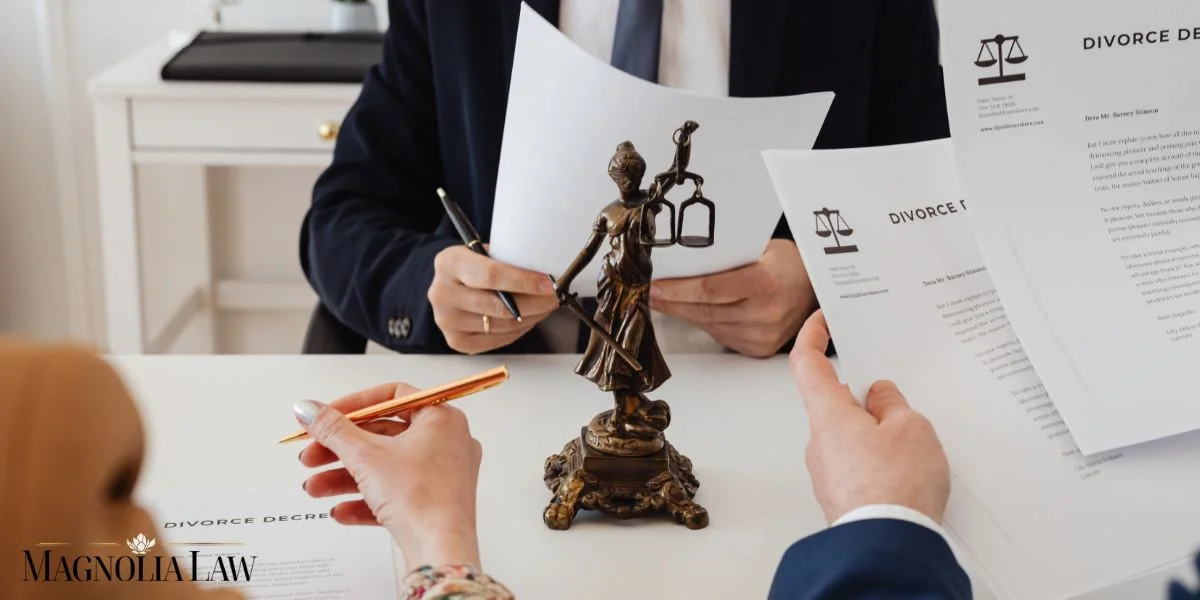Call: 225-369-5200
Assumption Parish Divorce Lawyer
Assumption Parish Divorce Attorney
Family legal matters can be emotionally difficult, overwhelming, and exhausting. Getting counsel, representation, and assistance from an Assumption Parish divorce lawyer can alleviate some of your stress as our law firm takes care of the legal work.

No-Fault and Fault-Based Divorce in Louisiana
Louisiana is a no-fault divorce state, which means that a spouse does not require a legal reason for the dissolution of marriage. However, for a couple to receive a no-fault divorce in Assumption Parish, there is a requirement for the length of their separation: couples who do not share any minor children must live separately for a minimum of 180 days or a minimum of 365 days for spouses with children under 18.
Louisiana state law also allows for fault-based divorce with the presence of valid grounds for divorce, which must be proved in a court of law. With this type of divorce, there is no need to meet the criteria for the duration of living separately. Grounds for divorce include adultery, domestic abuse against a child/spouse or the issuing of a protective order, felony conviction resulting in imprisonment or capital punishment.
Uncontested vs. Contested Divorce
Contested divorces happen when the spouses are unable to reach a resolution for one or more aspects of their divorce, requiring judicial intervention and litigation. Contested divorces rely on the findings and ruling decisions of a judge to settle disagreements between spouses. Sometimes, a couple is unable to negotiate or agree from the very beginning, and other times, a contested divorce follows failing attempts at an uncontested divorce.
An uncontested divorce is when a couple is either fully or mostly in agreement on the terms of their divorce, or they are willing to try negotiating and compromising over the various areas to settle. This approach is usually done through alternative dispute resolution, such as mediation or collaborative divorce, meaning their divorce proceedings are conducted outside the courtroom and judicial supervision.
Once the spouses are able to reach a settlement on all topics they previously disagreed on, they sign a legal agreement that outlines how matters are to be handled following the finalization of the divorce, which is then submitted to a judge. If the judge disapproves an element of the agreement or the couple cannot otherwise find resolutions independently, the spouses may be ordered to appear before the court.
Primary Components of a Divorce in LA
Below are the most common elements that must be addressed during divorce proceedings:
- Property division: Louisiana recognizes marital or community property that must be divided in an equitable manner following the dissolution of marriage. Each spouse is entitled to half of the total value of all community property.
All assets and debts acquired during the marriage are subject to fair division, with the goal being for each person to walk away with an amount of property that is equal in value; this does not always mean each singular asset is divided 50/50. - Child custody or visitation: Child custody will often extend divorce proceedings, regardless of spouses agreeing on every other issue, because each parent goes in with their own desired outcomes and preconceptions about custody terms.
Considerations that may influence the judge’s ruling regarding a child custody agreement can include each parent’s mental/physical health, home stability, and ability to provide. - Child/Spousal support: Child support ensures that children are adequately financially supported when spending time with each parent and that the lower-income or custodial parent has sufficient means to provide for the child’s needs.
Interim Spousal Support helps the lower-earning spouse during their transition into independence to be able to sustain a comparable standard of living as when married. The amount and duration of payments can vary and may be impacted by the presence of adultery, domestic abuse, and other inflicted harm.
Louisiana Divorce FAQs
Q: Does Your Divorce Lawyer Have to Be Local?
A: No, your divorce lawyer does not have to be local. However, it may be beneficial to seek out a divorce attorney within your area because they will already have an established familiarity with the local court system. Their insight likely comes from a deeper understanding of local statutes, procedures, and court behaviors. The attorneys at Magnolia Law practice in all of the parishes in the 23rd JDC; therefore, they have ample opportunity to interact and learn the general practice behaviors of the judges that serve the 23rd JDC. than that of a divorce lawyer from a neighboring or distant parish.
Q: How Much Does a Divorce Lawyer Cost in Louisiana?
A: On average, a divorce lawyer in Louisiana charges an hourly rate of around $200-$400. Several fees, including filing expenses, determine the total cost of a divorce in LA, which may vary.
Attorney and court expenses will likely fluctuate depending on how complex your divorce case is and the time required to resolve all issues. Your divorce lawyer will go over all costs you can expect from this process during your initial meeting.
Q: How Are Assets Divided in a Divorce in Louisiana?
A: In a Louisiana divorce, all community property is subject to equal division, meaning both spouses are entitled to half of the total value of all properties gained during marriage. This includes real estate, vehicles, savings accounts, debts, or other liabilities.
An exception is if the couple has a prenuptial agreement or other legally binding document specifying how property division proceedings should be conducted. Additionally, if the spouses agree on an alternative split process, this would supersede the equitable division law, as long as it is not leisonary.
Q: How Long Do You Have to Be Separated in Louisiana Before You Can Get a Divorce?
A: In order for a no-fault divorce to be finalized you and your spouse must be separated for a period of 180 days, or 365 days if you have minor children together. You are not required to live separate and apart the required time before filing. Speak to an experienced Assumption Parish attorney to determine when is the best timing to file for divorce. Separation entails living apart from one another with the intention of dissolving the marriage.
If there are grounds for a fault-based divorce – such as infidelity, a felony conviction, domestic abuse, a protective order, or a year or longer of abandonment – then there is no requirement for length of separation.
Talk With a Compassionate and Skilled Family Law Attorney
At Magnolia Law, our professional legal team is determined to utilize extensive legal experience and knowledge to help resolve your family law issues. Schedule a consultation with us today to put your family matters in capable hands.





